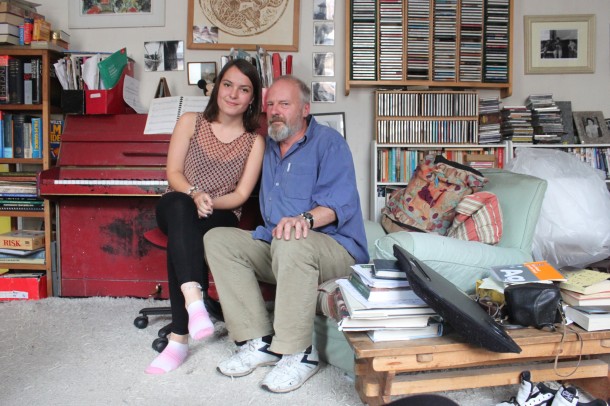
Some of Lambeth’s more desirable properties, including historic cottages in Clapham’s Old Town, have since the late 1970s been home to “shortlife” tenants. The residents pay low rents – in some cases, £10 a week – but are responsible for the costs of maintaining the houses themselves.
However, the arrangement is under threat, as Lambeth council is selling the houses at auction – which, in some cases, means evicting tenants. The council claims the money will be used to refurbish other social housing.
In the second of our series on residents of “shortlife” housing, Kaye Wiggins meets Stephen Blanchard and his partner Sarah. They live in Clapham with their three children, aged 15, 18 and 21.
Stephen: It started in the 1970s. I’d moved down from Hull where I was born, and I’d been living in various horrible bedsits and things.
I met a few people who were squatting in south London. I stayed in a squat in Stockwell for a few weeks, then moved around a bit then came to this house [in Clapham’s old town] as a squatter in about 1979.
At the time the houses had been bought up by the council for about £5,000 each, with the intention of knocking them down as slum clearance. But there was some problem with the funding and it all fell through, so they were left with hundreds of vacant properties.
It was the heyday of the squatting movement. So by about 1975 the whole street had become squatted.
Gradually during the 1980s we formed a cooperative with the other squatters on the street.
The council sort of invented the term “shortlife” as a way of formalising everything, so we became “shortlife tenants”. They were always careful to keep us at arms length because if we paid any rent to them we’d become council tenants and they’d have more responsibilities. So we paid rent to the coop.
That coop is still in place, and we pay them £10 a week in rent. We see it more as a membership fee, and on top of that, people pay for the maintenance of the houses themselves.
In March 1990 Sarah moved here, and then the children came along, so we filled up the house.
It was a nice place to live when the children were young because there’s a traffic-free street where they could zoom up and down on their trikes and things.
The kids think they’re really lucky to have grown up here. Even though it looks like we might have to move out, they say, at least we had those years of really having a nice time.
I’m a writer and I also make a living by selling vintage cameras, and Sarah works in a library. It’s been good that there’s not been much pressure to make a lot of money to pay rent.
Sarah: It’s made a difference with the kids. If we didn’t have this housing we wouldn’t have been able to spend so much time with the kids, we probably wouldn’t have had three children, and we might have spent a lot on childcare and had long commutes.
It’s given me almost an old fashioned life, when people could get by on one full time salary and have kids. I’m aware that I’ve got a good quality of life, I can cycle into work and it’s not very far.
Anyway, around 1997 there was a possibility that there would be a deal with Metropolitan Housing Trust. They would’ve refurbished our properties and then let us stay in them permanently. But in the end it didn’t happen.
Stephen: When that failed we were worried and thought the council would evict us. But they backed off for about 10 years. Then, about five years ago, we got a letter saying we’d have to move and about two years ago we got a notice to quit.
You just get used to living with that kind of uncertainty really.
Sarah: Still, I suppose lots of people have uncertainty to do with their housing, in different ways.
Stephen: We’re so used to living here and we’ve got friends and neighbours that are within range. Somehow it doesn’t seem fair that this should be sold off to people who have no connection to the borough.
We’d be prepared to pay social rent on this place, and even do the repairs ourselves, but it doesn’t seem to be an option because Lambeth wants the cash from selling the house.
I can understand the council’s argument that you could sell these houses and use the money to build new social housing or refurbish existing council housing.
But it’s like they’re connecting the two things when there’s no link between them, and saying, because we’ve got this problem [with our finances] then you’ve got to lose your home. Forcing people out of their homes is not the usual way of funding council services.
If they sell these houses then in 10 years’ time that money will have disappeared and the council will still have arrears in repairs. They’ll still have enormous problems housing people and a huge waiting list.
The pressure is from the high house prices. If you walk round Hull where I’m from, the houses cost about £100,000.
But when we were protesting outside the [former shortlife] houses that were being sold, the kind of people who were coming to view them were obviously very wealthy. These places were built as artisans’ cottages for working people and suddenly only the very wealthy can afford to live here.
To me it seems like quite an ordinary thing for a family to live in an ordinary house, but it’s become something like an impossible dream that only the very rich can afford.







When people like Steve moved into the area they had nowhere else to live and were on the council waiting list. The council sanctioned the co-ops that were set up (recognising that someone else was going to do their job for them and maintain stock that would otherwise have been demolished) but then pulled away and left everything in a vacuum, filled by the communities themselves. The co-ops set their own rents, some charged higher rents and some charged nominal fees and put the onus on the individual to maintain their own houses. Even here there was central pot that would be used for large-scale renovations, especially if the resident was not financially able to carry them out. The council wanted no financial arrangements with the co-ops. Had residents been offered the chance to stay in their homes and pay a social rent they would have jumped at the chance. Before she was elected Cllr Mary Atkins told me that she thought tenancies should have been offered. Certainly Cllr Helen O’Malley and Kate Hoey share that view. Sadly nobody else in the Lambeth Labour Party seems to care and would rather sell off social housing and push people onto the waiting list, changing the mix of our communities with a purge. As ever, nothing in life is simple and you have to take a bit of time to understand the story behind this article.
Only £10 a week in rent with some vague responsibility for maintenance?! Most working people have to pay many times more than £10 a week in either rent or mortgage payments plus bills AND usually have some responsibility for the upkeep of their homes. All good things come to an end even after 30 years of living on the cheap.